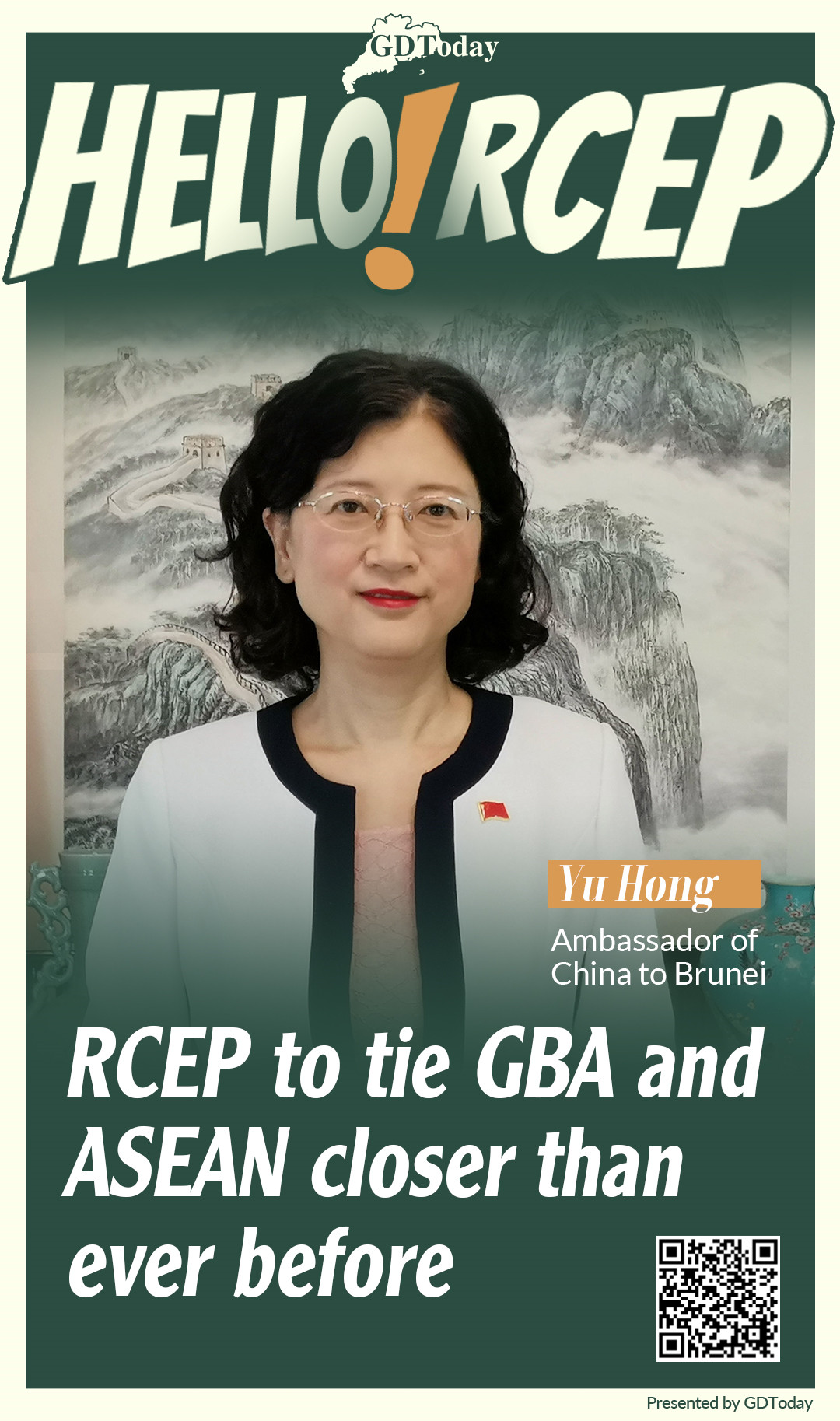Editor’s note: the Regional Comprehensive Economic Partnership agreement (RCEP) will come into effect on Jan 1, 2022. How will RCEP benefit the trade partnership in the region? How are companies planning to seize this opportunity? More insight could be found in “Hello! RCEP” presented by GDToday.
“The member countries of the RCEP made a commitment to cut tariffs, open markets and reduce barriers when the Covid-19 pandemic swept the world and cross-border investment declined. It’s a vital chance to enhance economic partnership between the member countries,” according to Yu Hong, Ambassador of China to Brunei.

Yu Hong, Ambassador of China to Brunei.
A report of the Peterson Institute for International Economics shows the RCEP will add 186 billion USD to the world economy by 2030. It will raise trade among members by 428 billion USD and reduce trade among nonmembers by 48 billion USD.
RCEP will take effect in six member states of ASEAN including Brunei, Cambodia, Laos, Singapore, Thailand and Vietnam and four non-ASEAN countries including China, Japan, New Zealand and Australia on January 1, 2022.
Yu Hong pointed out that China is the largest economy among the member states while other RCEP members including Brunei are important trade partners of China.
Based on statistics provided by the Chinese Embassy in Brunei, bilateral trade volume between China and Brunei increased 72.5 percent in 2020 even under the pandemic while the number hit record high 2.37 billion USD from January to October in 2021. This cooperation has been extended into such areas as energy, petrochemical, infrastructure, financial services, e-commerce, fisheries, tourism and smart healthcare.
Yu Hong stressed that the RCEP will facilitate trade in goods and boost trade volume between China and Brunei.
“Based on the agreement, over 90 percent of goods will eventually enjoy zero tariffs while the Cumulative Rules of Origin will allow more commodities to enjoy preferential duty. It will also enable Brunei’s agricultural and fishery products to enter China more easily because the customs clearance time will be shortened to 6 hours for fast deliveries and perishable commodities,” Yu elaborated.

China’s Zhejiang Hengyi Petrochemical Project on Pulau Muara Besar is the largest single foreign-invested project in Brunei. [Photo/Xinhua]
In addition, Yu Hong said RCEP has a special chapter on cooperation between small and medium enterprises, which is expected to improve market access for SMEs and encourage SMEs to adopt new technologies. “97.3 percent of enterprises in Brunei are small companies with less than 99 employees. RCEP will facilitate Brunei’s SMEs to recover from the pandemic and contribute to their cooperation with Chinese partners.”
“RCEP will facilitate trade services and bilateral investment between members as well. China adopted a negative list approach to advance investment liberalization in an international agreement for the first time and made commitment to further opening-up in such sectors as construction, transport, logistics, medical care and finance,” she added.
As for regional cooperation, Yu Hong highlighted that RCEP is expected to tie the Guangdong-Hong Kong-Macao Greater Bay Area and the ASEAN countries closer than ever before while further activating regional trade and investment.
“Thus far, lots of Greater Bay Area enterprises have invested in Brunei and formed partnerships with local companies in the fields of information technology and communication, agriculture and fishery, food and services,” said Yu Hong.
Yu Hong believes the RCEP will inject powerful impetus into the trade and investment between Greater Bay Area and ASEAN considering the GBA is one of the most economically active regions in China while it is also the closest region to the Southeast Asian countries along the Belt and Road.”
Author: Jasmine
Graphic designer: Yang Chenyue
Editor: Wing, Jerry




